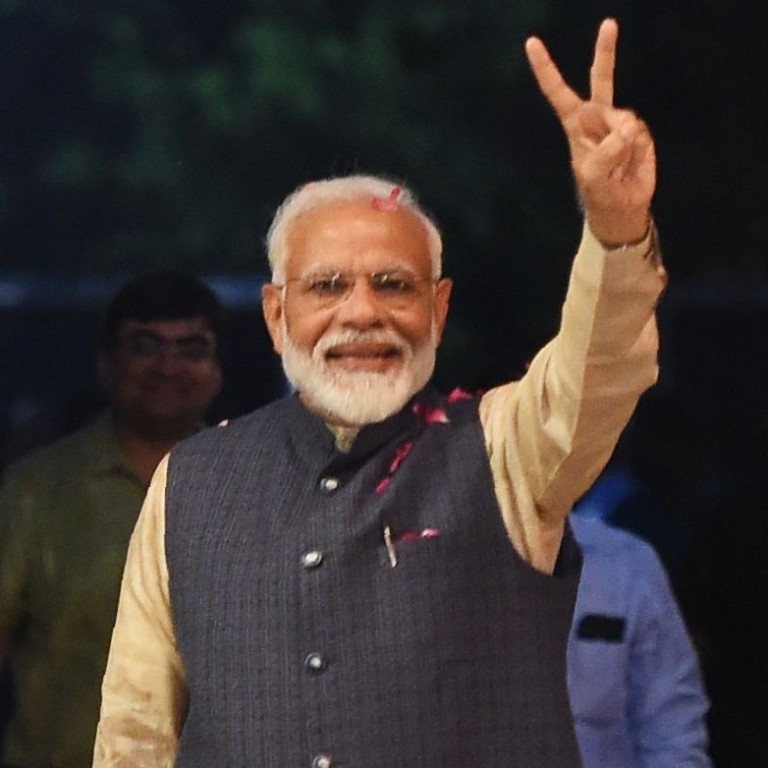
India election: Narendra Modi claims victory for BJP, pledges to build ‘inclusive India’
- The Prime Minister on Twitter said ‘India wins yet again!’ as partial vote counts showed his party leading in 302 out of 542 seats. The BJP’s main opposition, the Indian National Congress, was leading in 50 seats
- Chinese President Xi Jinping and Pakistan PM Imran Khan congratulated Modi on his victory and expressed satisfaction with bilateral ties
Even as vote-counting continued into the night, official data from the Election Commission showed the BJP ahead in 302 of the 542 seats up for grabs, up from the 282 it won in 2014, and more than the 272 seats needed for a majority in the lower house of parliament. That would give his party the first back-to-back majority for a single party since 1984.
Modi had celebrated victory after seven hours of vote-counting showed the BJP was leading in 299 out of 542 seats. “Together we grow. Together we prosper. Together we will build a strong and inclusive India. India wins yet again!” Modi said on Twitter.
Speaking to the press later, he said: “If someone has won, it is India, it is democracy. This is the highest voter turnout that India has seen. The world will have to recognise India’s democratic strength.”
At the BJP’s headquarters in Delhi, delirious supporters banged drums and smothered each other in saffron paint.
But for Gandhi, it was a humiliating drubbing, brought about by fumbled communications on key policies, with a publicity campaign this year that escaped the notice even of some of its own workers, and a failure to forge pre-election alliances in key states, according to party officials who spoke to Reuters.
The scion of the Nehru-Gandhi family dynasty congratulated Modi and the BJP for their win, as did world leaders.
On Thursday evening, India’s Ministry of External Affairs issued a press release saying Chinese President Xi Jinping had written to Modi.
Xi noted the importance China attached to its ties with India and his desire to take their partnership “to a new height”, the statement said. It was shared on Twitter by ministry spokesperson Raveesh Kumar.
Others who extended their congratulations included Pakistan Prime Minister Imran Khan, Sri Lanka’s Prime Minister Ranil Wickremesinghe and President Maithripala Sirisena, Israel’s Prime Minister Benjamin Netanyahu, and Japanese Prime Minister Shinzo Abe.
Political analysts believe Modi’s victory was as much a result of his own popularity as the opposition’s inability to put up a fight.
“The opposition’s campaign focused only on ousting Modi. However, there was no alternate vision that was projected in their campaigns, nor any ideas on what their development strategies were, if they came to power,” says Prakash Bal, a Mumbai-based political analyst.
Modi’s re-election reinforces a global trend of right-wing populists sweeping to victory, from the United States to Brazil and Italy, often after adopting harsh positions on protectionism, immigration and defence.
Modi has slashed red tape in the world’s fifth-largest economy, though some overseas firms have complained about policies they say are designed to benefit domestic rivals.
He will face demands to provide jobs for the tens of millions of young people coming on to the market in the next few years and to boost depressed farm incomes.
“The immediate challenges are to address employment, the issue of agricultural income and revive the banking sector,” said Madan Sabnavis, chief economist at Care Ratings in Mumbai.
Can India’s tradition of diversity withstand a second ‘Modi wave’?
However, campaigning shifted towards India’s relationship with Pakistan after a suicide bomber killed 40 Indian police in February in the Himalayan region of Kashmir claimed by both countries.
Modi ordered an air strike on what India said was a militant training camp on the Pakistani side of the border, a tough response that benefited the right-wing BJP, analysts said.
While Pakistan has signalled a willingness to open talks with India, it also displayed its military might, with the test of a surface-to-surface ballistic missile with a range of up to 2,400km.

The BJP has also capitalised the star power of Modi, a frenetic campaigner, as well as its superior financial resources.
It outspent Congress by six times on Facebook and Google advertising, data showed, and by as much as 20 times overall, sources told Reuters this month.
The main opposition Congress party was ahead in just 51 seats, but its leader Gandhi, twice defeated in general elections by Modi, refused to rule out resigning as party chief in a brief televised news conference.
Gandhi, whose father, grandmother and great-grandfather all served as prime minister, lost to the BJP candidate in the northern constituency of Amethi the family has held almost continuously for the last four decades.
Election Commission results showed BJP textiles minister Smriti Irani was ahead by 38,000 votes in Amethi, a longtime Gandhi family bastion in the north Indian state of Uttar Pradesh.
But Gandhi was leading in the southern constituency from which he is also running for parliament.
The party’s slide will undoubtedly raise questions about its future and the role of the Gandhi family.
In Uttar Pradesh, which elects the bulk of India’s lawmakers, Congress this year drafted in Gandhi’s charismatic sister, Priyanka Gandhi Vadra, to burnish its fortunes. But that made little difference to results.
“The Congress party has not been able to improve at all,” said Rahul Verma, a fellow at the centre for Policy Research in New Delhi.
“One big story is the emerging challenge for the Congress to remain a national alternative to the BJP. That now is under question.”
Additional reporting by AP, Reuters and AFP



